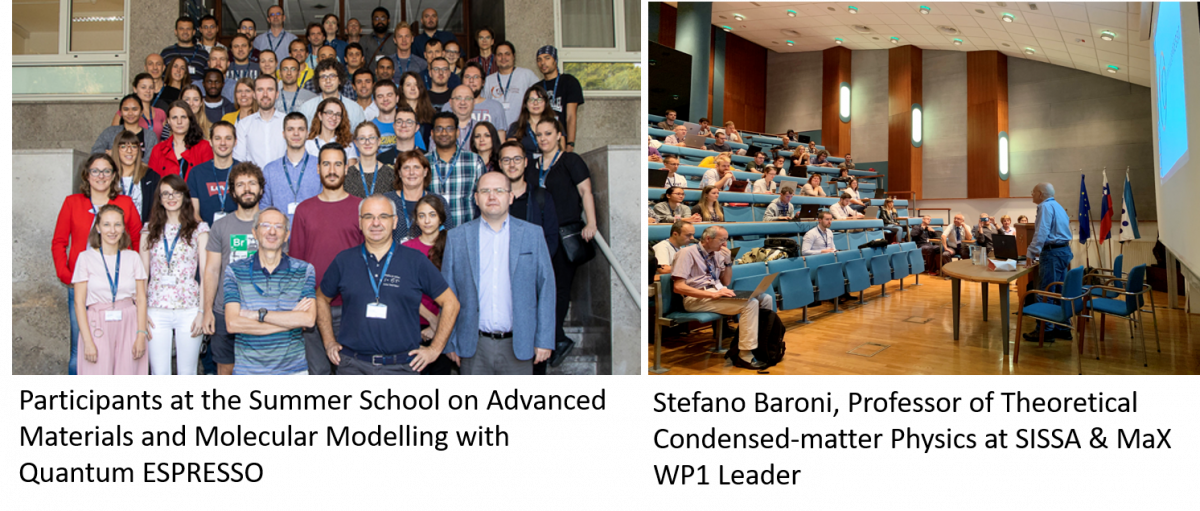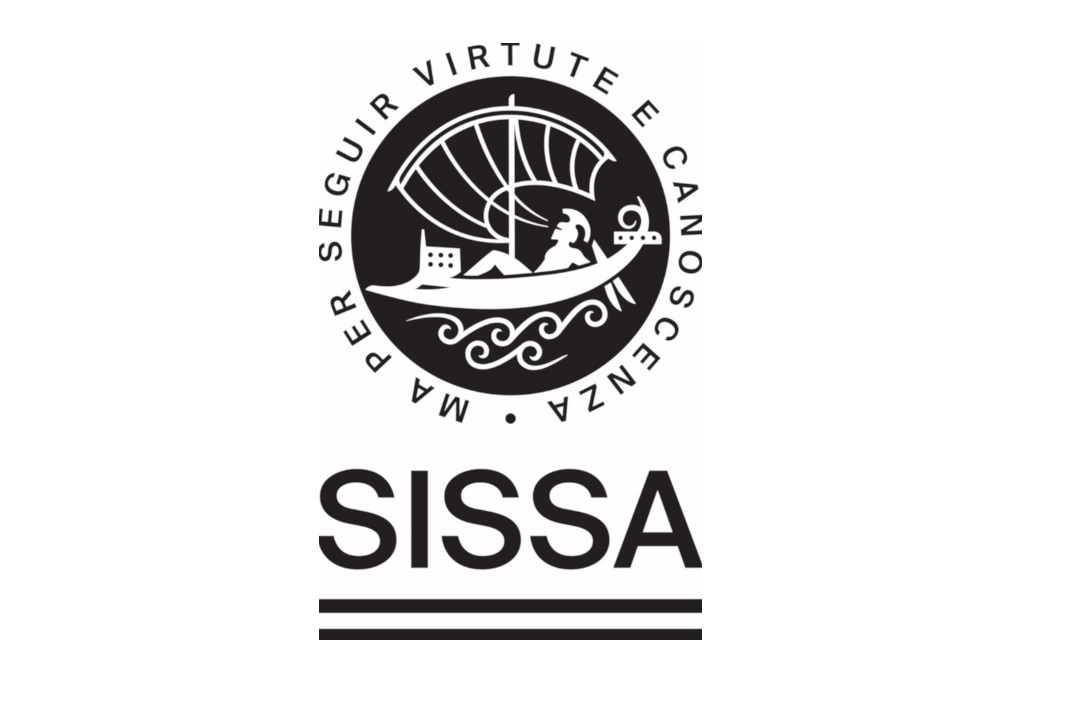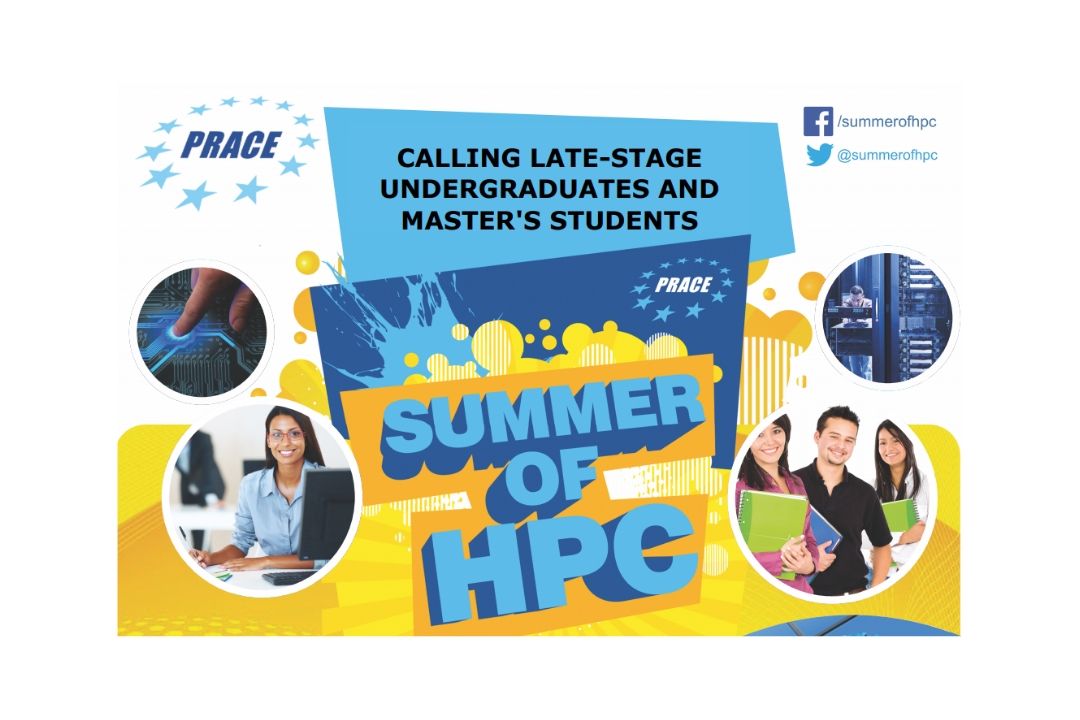MaX Highlights on 2019 Summer School and Workshops
MaX (Materials design at the eXascale) is a European Centre of Excellence which enables materials modelling, simulations, discovery and design at the frontiers of the current and future High-Performance Computing (HPC), High Throughput Computing (HTC) and data analytics technologies.
In 2019, MaX organised several workshops, training and school in partnership with the relevant organisations in HPC, HTC and materials modelling which were offered to scientific, academic, industrial communities and the general public.
Find out more below as we provide some highlights on those events.
AiiDA plugins migration workshop
The first MaX Workshop "Aiida plugin migration workshop", organised in partnership with EPFL and NCCR Marvel, took place at EPFL Headquarter in Lausanne last 25th - 29th March 2019. The main goal was to directly support AiiDA plugin developers in the migration of their plugins to endorse both python 2 and python 3, as well as the changes introduced in AiiDA 1.0.
This event gathered 25 participants which focused on migrating existing plugins: a full list of the plugins supporting almost 60 different codes can be found on the AiiDA plugin registry page.
You can watch here the recorded lectures of the 2019 plugin migration workshop (aiida-core 1.0.0b2).
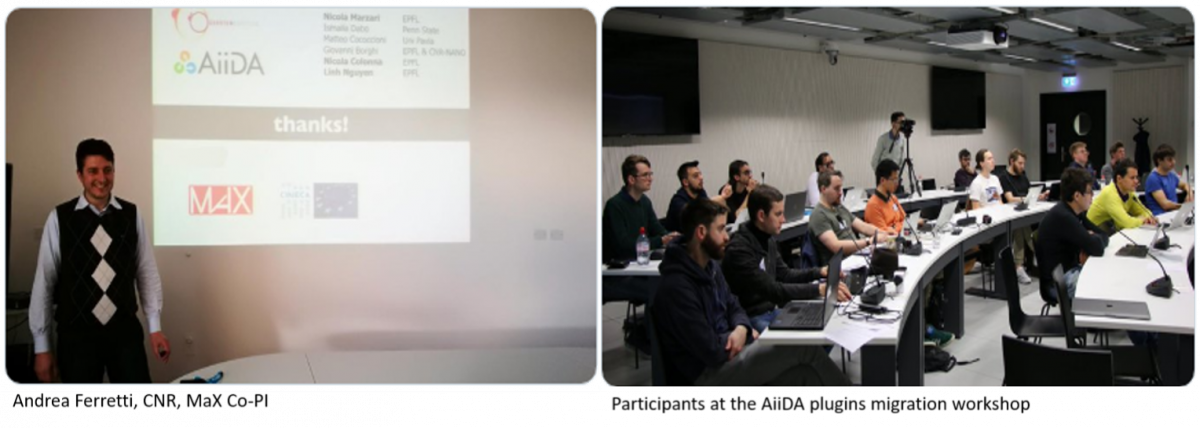
You can watch here the recorded lectures of the 2019 plugin migration workshop.
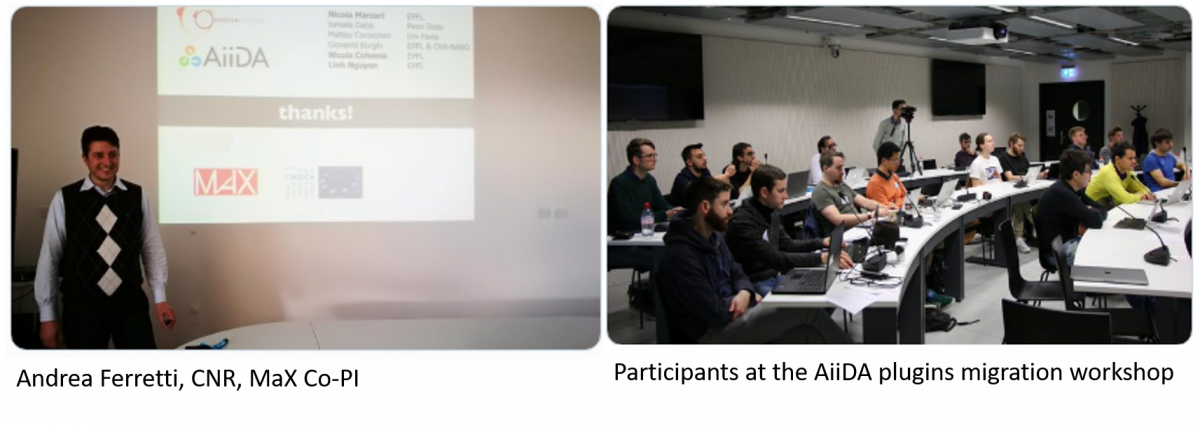
Tutorial on writing reproducible workflows for computational materials science
A 3-5 days tutorial on “Writing reproducible workflows for computational materials science” was organised by AiiDA last 21-24 May 2019 in Lausanne sponsored by MaX, EPFL, NCC Marvel, PSI-K and INTERSECT.
This event gathered 50 participants such as Master students, PhD students and Postdocs from the field of computational materials science started with writing reproducible workflows. Participants were introduced to the state of the art in workflow management and high-throughput computation by experts in the field and had the opportunity to gain in-depth and hands-on experience using a tool that they may directly apply to their own research.
Check out the Hands-on instructions here.

A 3-5 days tutorial on “Writing reproducible workflows for computational materials science” was organised by AiiDA last 21-24 May 2019 in Lausanne sponsored by MaX”, EPFL”, NCC Marvel”, PSI-K” and INTERSECT”.
This event gathered 50 participants such as Master students, PhD students and Postdocs from the field of computational materials science started with writing reproducible workflows. Participants were introduced to the state of the art in workflow management and high-throughput computation by experts in the field and had the opportunity to gain in-depth and hands-on experience using a tool that they may directly apply to their own research.
Check out the Hands-on instructions here:. 
One day Blender Course
Last 27 June 2019, CNR Nano and the MaX European Centre of Excellence organised its first-ever school course in Modena (Italy) which successfully gathered 26 participants from the education sector, industrial and academic end-users stakeholders.
This course on Blender aims to improve the quality of our scientific communication and will provide hands-on knowledge to better-produced images and animations from 3D (scientific) data.
In case you missed the course, visit MaX event to have an overview of the upcoming training and workshop.

Last 27 June 2019,CNR Nano” and the MaX European Centre of Excellence organised its first-ever school course in Modena (Italy) which successfully gathered 25 participants from the education sector, industrial and academic end-users stakeholders.
This course on Blender aims to improve the quality of our scientific communication and will provide hands-on knowledge to better produce images and animations from 3D (scientific) data.
In case you missed the course, visit MaX event to have an overview of the upcoming training and workshop..
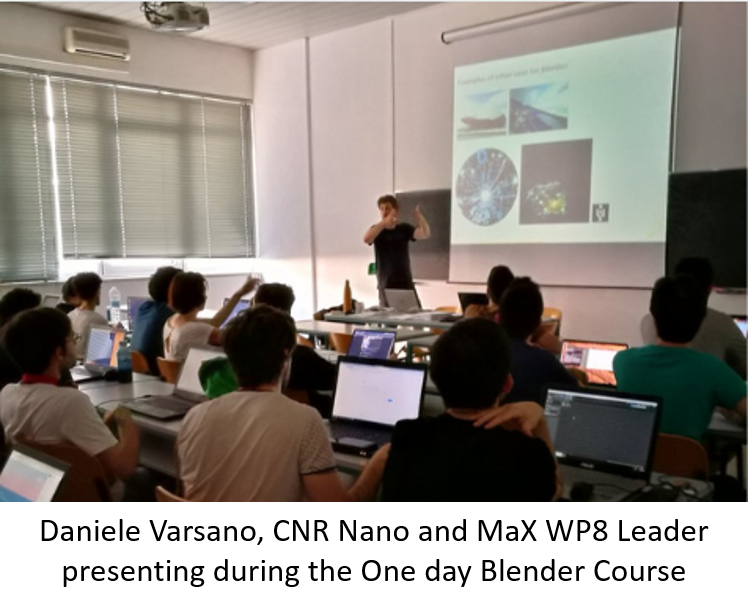
Picking flowers: Hands-on FLEUR
The full-potential linearised augmented plane-wave (FLAPW) method has emerged as a robust and precise state-of-the-art technique with reasonable computational efficiency. It is widely accepted as providing the reference solution. However, the proper usage and application of DFT methods and FLAPW methodology, require thorough training where users have the opportunity to meet-up developers of such methods.
A 5-day workshop/school was held last 9th - 13th September 2019 in Forschungszentrum Jülich premises in Germany, organised by MaX together with FLEUR and Forschungszentrum Jülich, featured lectures covering three main areas:
a) the underlying basic theory,
b) the installation and usage of FLEUR and its AiiDA interface,
c) more specialized theoretical description relevant for typical FLEUR calculations.
This event trained the 10 participants in using all-electron FLAPW DFT code FLEUR and associated codes like Spex-FLEUR, a code for many-body perturbation theory, and G-FLEUR, an embedding code. It also addressed the usage of FLEUR within the AiiDA infrastructure to build automatic work-flows applicable to materials screening applications.
All the presentations are available at this link https://www.flapw.de/site/fleur-workshop-tutorial-2019/
Visit the MaX Training link to see the material related to the MaX flagship codes.

The full-potential linearised augmented plane-wave (FLAPW) method has emerged as a robust and precise state-of-the-art technique with reasonable computational efficiency. It is widely accepted as providing the reference solution. However, the proper usage and application of DFT methods and FLAPW methodology, require thorough training where users have the opportunity to meet-up developers of such methods.
A 5-day workshop/school was held last 9th - 13th September 2019 in Forschungszentrum Jülich premises in Germany, organised by FLEUR and Forschungszentrum Jülich, featured lectures covering three main areas:
a) the underlying basic theory, b) the installation and usage of FLEUR and its AiiDA interface, c) more specialized theoretical description relevant for typical FLEUR calculations.
This event trained the 51 participants in using all-electron link.
Visit the MaX Training link to see the material related to the MaX flagship codes.
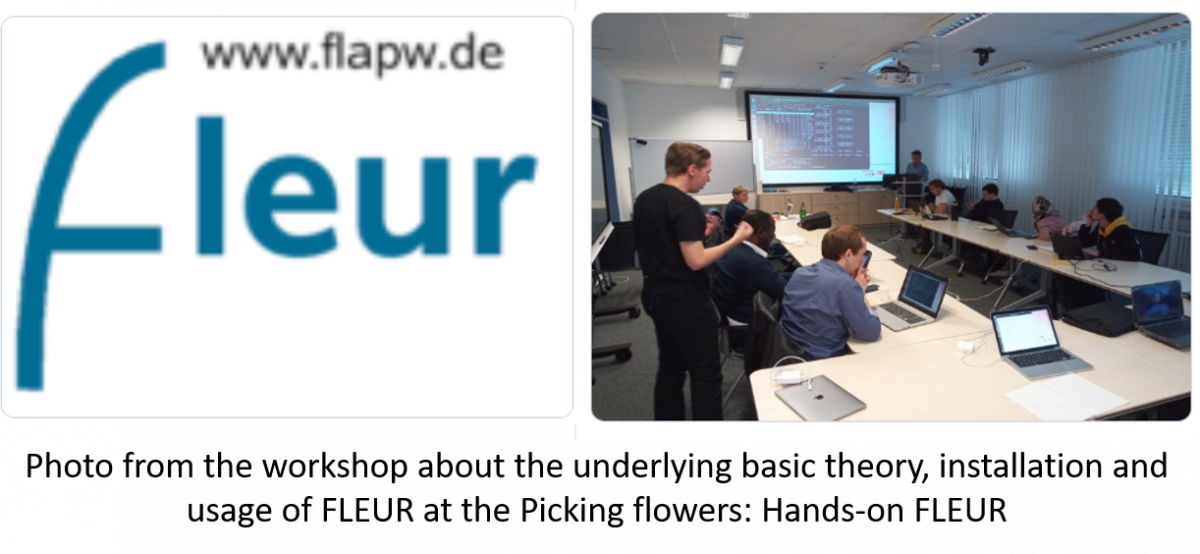
Summer School on Advanced Materials and Molecular Modelling with Quantum ESPRESSO
A one-week summer school on “Advanced Materials and Molecular Modelling with Quantum ESPRESSO” was held last 16-20 September 2019 in Ljubljana, Slovenia.
The school followed a two-decade-long tradition of QUANTUM ESPRESSO Foundation training courses that have been held all over the world and is part of an ongoing effort of the MaX Centre of Excellence to widen the scope of its action to European countries outside the consortium, in association with Jožef Stefan Institute.
This school covered basic concepts as well as recent advances and developments, with emphasis on density-functional-theory based methods and high-performance computing. It gathered 44 attendees with the specific purpose to introduce students, postdocs, and other researchers to materials and molecular modelling with Quantum ESPRESSO.
Find out more and check out the summer school book of abstract here.
A one-week summer school on “Advanced Materials and Molecular Modelling with Quantum ESPRESSO” was held last 16-20 September 2019 in Ljublijana, Slovenia.
The school followed a two-decade-long tradition of MaX Centre of Excellence to widen the scope of its action to European countries outside the consortium, in association with Jožef Stefan Institute
.
This school covered basic concepts as well as recent advances and developments, with emphasis on density-functional-theory based methods and high-performance computing. It gathered 44 attendees with the specific purpose to introduce students, postdocs, and other researchers to materials and molecular modelling with Quantum ESPRESSO.
Find out more and check out the summer school book of abstract here.
